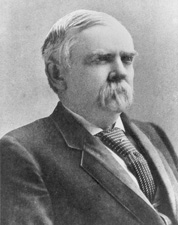George Graham Vest
| George Vest | |
|---|---|
 |
|
|
United States Senator from Missouri |
|
|
In office March 4, 1879 – March 3, 1903 |
|
| Preceded by | James Shields |
| Succeeded by | William Stone |
|
Confederate States Senator from Missouri |
|
|
In office January 12, 1865 – May 10, 1865 |
|
| Preceded by | John Clark |
| Succeeded by | Constituency abolished |
| Member of the C.S. House of Representatives from Missouri's 5th district |
|
|
In office February 18, 1862 – January 12, 1865 |
|
| Preceded by | Constituency established |
| Succeeded by | Constituency abolished |
| Member of the Missouri House of Representatives | |
|
In office 1860 |
|
| Personal details | |
| Born |
December 6, 1830 Frankfort, Kentucky, U.S. |
| Died | August 9, 1904 (aged 73) Sweet Springs, Missouri, U.S. |
| Political party | Democratic |
| Alma mater |
Centre College Transylvania University |
George Graham Vest (December 6, 1830 – August 9, 1904) was a U.S. politician. Born in Frankfort, Kentucky, he was known for his skills in oration and debate. Vest, a lawyer as well as a politician, served as a Missouri Congressman, a Confederate Congressman during the Civil War, and finally a US Senator. He is best known for his "a man's best friend" closing arguments from the trial in which damages were sought for the killing of a dog named Old Drum on October 18, 1869.
Vest graduated from Centre College, Danville, Kentucky, in 1848 and from the law department of Transylvania University, Lexington, Kentucky, in 1853. He was admitted to the bar in 1853 and planned to move to California. However, while en route, he stopped in Pettis County, Missouri, where he defended a young African-American man accused of murder. Vest's client was acquitted but soon burned at the stake by an angry mob. Vest's own life was also threatened, but he nonetheless decided to stay in Missouri permanently, settling in Georgetown. In 1854 he married Sallie Sneed of Danville, Kentucky. They had three children, two sons and a daughter.
In 1860, after moving to Boonville, Missouri, he was elected to the Missouri House of Representatives and served as a Democratic presidential elector. As a Missouri representative he was chairman of the Committee on Federal Relations. Vest served in the House until late 1861 during which he wrote the Vest Resolutions in which he denounced coercion of the South.
...
Wikipedia
